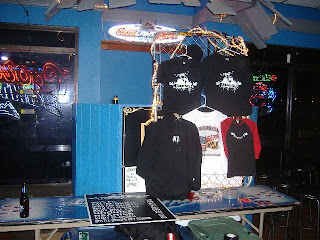You don't know how much it aggravates me when I meet a new independent band and the first thing out of their collective mouth is "When we get signed..." I just want to shake them and say "Get signed? Why on EARTH would you want to get signed?"
You see, what most bands don't understand is that Record Labels, like the rest of the free world at the moment, have no money. And what little money they do have, they spend on promotional fees and outdated advertising campaigns to shoot their mediocre talent to the fame equivalent of the stratosphere only to drop them on a dime when their albums don't sell. It's a broken system, and although, granted, there are some small gracious labels out there doing it right, they are few and far between and the ratio of talent to quality labels is somewhere at about 1 zillion to 1.
360 deals work for HUGE performers like Jay-Z and Madonna because they can negotiate their own terms. They (and their team of 100 lawyers) decide how much they make, how much they work and how long they are obligated to do so. The companies (i.e. Live Nation) putting out the money for these huge d
 eals for these artists have complete faith that they will continue to be successful and they are willing to make sacrifices to get those names on their roster.
eals for these artists have complete faith that they will continue to be successful and they are willing to make sacrifices to get those names on their roster.What is a 360 deal exactly?
360 deal is a term used to describe a contract that a company or record label offers to an artist or band. It is called a 360 deal because it covers everything that artist earns, not limited to only recordings or merchandise or appearances, but the whole she-bang. Usually the artist or band is offered a lump sum up front (varies depending on success of artist and earning potential) and a percentage of total earnings throughout the allotted time of the deal. The company would front the money for everything involved in promoting and managing the artist such as tour costs, recording costs, merchandise manufacturing costs, marketing costs, radio airplay costs and any incidentals. Whatever the artist earns from touring, album sales, digital downloads and merchandising would all go directly back to the company and the artist would earn a percentage of all of it as per the contract.
So that seems good, why wouldn't I want that for my band?
Here's the thing. When you don't own any of the material you put out, you can't control the material you put out. In this day and age, 360 deals are almost a step backwards in the evolutionary process. When we have all of this amazing and often free digital media at our fingertips and are able to be more lucrative independently with a little more hard work, why would you want to surrender the majority of your potential income over to some company just because they're willing to give you a modicum of that up front?
In addition to that, factor in the fact that the majority of artists aren't hugely successful and can't negotiate a large percentage of their earnings for themselves, chances are by signing a deal like that you will be forfeiting a large amount of money that could have been yours.
Sure, by agreeing to a 360 deal you will most likely get a sum of money nobody can shake their head at, but money doesn't last forever and most artists prefer to have control over the way that they are represented in the media and in their music. 360 deals are basically the music industry equivalent of selling your soul to the devil, except the devil is a middle aged businessman who knows nothing about music.

But what does this have to do with merchandising?
Good question! Pretty much everything. You see, most often when a band or artist signs to a record label, the label handles the cost of producing the album, promoting it and distributing it. This is called a P&D (production and distribution) deal. Sometimes the label will cough up tour costs. Sometimes they will offer artist development like media training and makeovers. Most often (especially now that they're all basically one album away from bankruptcy) they just offer P&D deals and expect booking agents and management teams to take care of the rest. This means that although they aren't coughing up any money for merch, they also can't collect any money made from merchandise sales, so the majority of that financial income goes directly back to the artist. This comes in handy when your publishing money has run out and you are in the middle of Saskatchewan on tour in need of a Sandwich!
Merchandise is basically the only remaining portion of income that a record label often can't touch, and not only that, but its quite easy and often cheap to build a financial income from it if you follow the right path and make the right investments. Its generally the only money you'll be taking home at the end of a tour, so you've really got to take into consideration how much of that you'd be willing to compromise for a little bit of cash up front.
There are definitely pro's and con's to both sides of the coin. I think it boils down to the type of artist you are and the control you want to have over your own brand. Seems simple enough, right?






1 comment:
Thats funny because I'm from saskatchewan and I know exactly what you mean.
Post a Comment